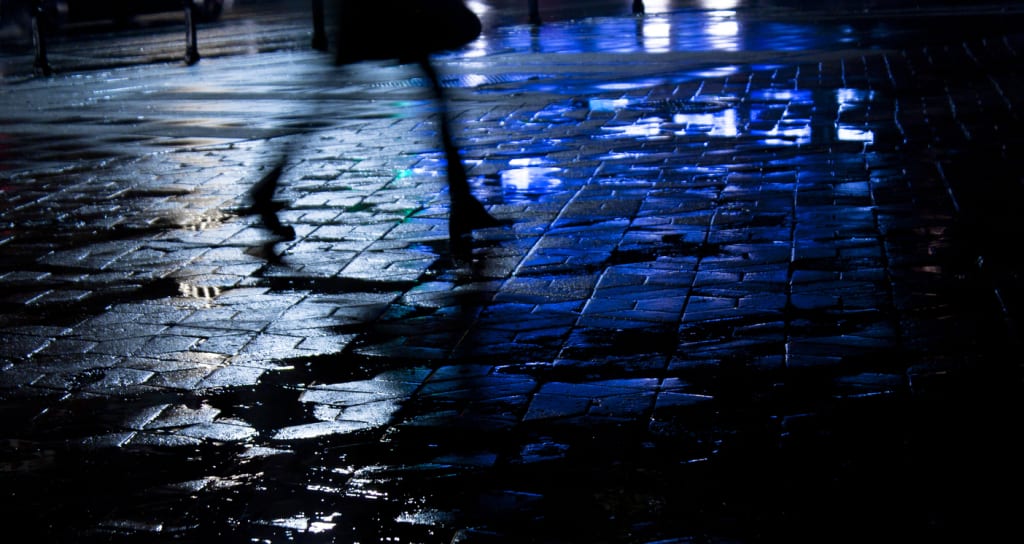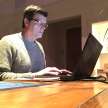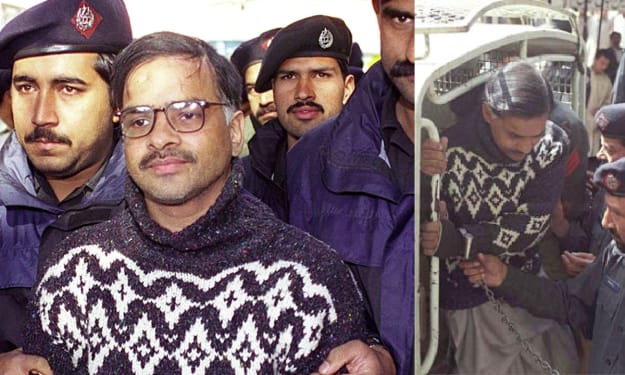Intellectual property
Academic Thievery

A metallic clinking noise somewhere close by, keeping time with the side-to-side motion of the train, is the first thing Heide Ferrone notices when regaining consciousness. Opening her eyes, she finds her face pressed against worn leather that smells of body odor and is wet from her drool. Attempting to sit up, she winces in pain from the stiffness in her lower back, and once upright, a wave of nausea washes over her, and she closes her eyes, willing it to pass.
Someone unceremoniously had thrown her across two seats inside a passenger train car and judging by its movement, the train was traveling at a high rate of speed. She can't see any other passengers within the car, and lifting her right arm to wipe her face, it jerks to a stop halfway through the motion. Her handcuffed right wrist has a short chain connecting the other cuff to the armrest, the chain swinging against a steel support post, making the clinking noise.
Confusion and fogginess give way to panic, which sharpens her senses but doesn't help with her memory block. "What the hell is going on?" she shouts into the empty car while looking around in fear. She has no bearings and no recollection of how she ended up chained to the seat. The windows are black on a moonless night, and only weak lights in the distance fade as they are left behind.
The world in 2035 has become a dangerous place, the last ten years seeing dramatic increases in homegrown terrorist attacks on major cities and their infrastructure. The frequency of the attacks makes the mayhem almost commonplace—people have transformed their homes into safe sanctuaries and self-imposed prisons. Companies no longer require office workers to report in person, they monitor their production with AI-driven software. Manual laborers and those in service sector jobs who still need to show up dread their dangerous commutes.
Heide, a math prodigy at an early age, obtained her Ph.D. at 25 and is currently the youngest professor to ever teach at her alma mater north of London.
Images from last night start filtering in, and she struggles to reconstruct the missing hours that landed her here. Staring down at the cuff encircling her wrist, she sees a little play between her skin and the hardened steel.
She can remember the sound of ice cubes dropping into a tumbler and a glass half filled with amber liquid held before her eyes. The glass is close to her face, and she sees condensation running along its sides. The background is blurry and unrecognizable.
She checks her pockets and discovers her cell phone and faculty ID are missing. She placed a Chapstick tube in a zipped pocket near her skirt's waistband and, patting the area, found it still there. Taking out the tube, she slathers the balm onto her wrist, hand, and the edges of the cuff. When finished, she moves her hand back and forth against the metal while squeezing it inward to make it as small as possible. She can feel some progress, but the metal digs hard into her skin, and the pain takes a toll.
Heide remembers her skirt being unzipped and falling to the floor and realizes she had been with Stan. For the past three months, she has had an intimate relationship with Stanly Baker, a man 25 years her senior and the head of the universities math department. She initially went to him for advice on her research project, but after a few drinks, the meeting turned sexual. She knew he was married but continued to see him weekly. He was always eager to hear about her research progress and listened intently before undressing her.
Heide sees the earliest sign of dawn breaking on the horizon, and the thought of a new day feels hopeful.
The train shudders and its iron wheels squeal as it enters a sweeping curve, and Heide, grasping the armrests, presses herself low in the seat. The shaking confirms her suspicion that the train is moving at an unsafe speed.
She remembers it was dusk when she left the lab and walked toward the administration building. Her research had been going exceptionally well, with a significant breakthrough coming a few days earlier. She had mathematically proven her theory was sound. And if her idea transformed into something practical, there was the potential to significantly improve electrical storage efficiency. She was excited to tell Stan the news and loved that he was interested and understood the complexities of her research. Reaching the courtyard of the administrative building, she cut across its grassy expanse rather than taking her preferred route along the 200-year-old colonnade.
Heide had considered ending the affair; she no longer wanted the guilt of being the other woman with a married man but must have lost her resolve at some point during the evening.
Pulling hard against the handcuff, she knows surviving a crash or derailment will require her to be free to move. The pain is intense and gritting her teeth, she jerks her arm with all her strength. After four violent attempts, her hand slips through, minus a patch of skin above her thumb. Jumping up, she searches for something in which to wrap the wound. Pressing it firmly against her blouse, she looks through two additional empty cars before finding clean linen napkins in the dining car. With trembling hands, she wraps the wound the best she can. The horizon continues to brighten, and it won't be long before she can see the surroundings where the train is traveling.
She remembers passing through the math department's empty lobby and up two flights of stairs to Stanly's office. Usually, his door is open when anticipating her arrival, but last night it was closed, and she could hear him talking in another language on the phone. She knew he wasn't from England by his accent, but she had never inquired about his past. In fact, besides their mutual interest in her project and sex, she knew very little about the man.
Heide continued moving forward, passing through two more empty cars before reaching the car coupled to the engine. There wasn't any access from the car to the engine. She didn't know if anyone was operating the train but suspected she was the only person aboard. Even if she could reach the control room, she wasn't confident she could stop the train. She felt isolated and alone, without any way to communicate with the outside world.
Seeing blue lights in the distance, she scrambled on her knees across a seat and, pressing her face to the glass, saw the outline of a road intersecting the tracks. The farmland landscape interspersed with smaller forested areas was starting to materialize in the dim, grey morning light. And as the train thunders past the road, she sees a police van parked sideways at least a quarter mile from the tracks. The distance is a concerning sign, a precaution used with the threat of explosives. Like a missile rocket, the train might be a carrier bringing a devasting payload to an unsuspecting population and Heide at ground zero.
The authorities had been alerted to the threat of the unmanned train by a video sent to the BBC. The police inside the van, watching it pass through binoculars, saw Heide's form silhouetted against the passenger car window and radioed that information to the command post. The terrorist instructions included a warning that the train was under constant observation and that any attempt to send in a team would have disastrous consequences.
A counter-terrorist think tank envisioning this exact train-style attack had developed countermeasures to neutralize the threat. A military helicopter scrambled from a British airbase had onboard a team of demolition experts and equipment heading for a destination 144 kilometers in front of the train. There they would deploy a decoupler device consisting of a detector for measuring speed coupled to a mortar-style explosive placed in the center of the track. The precision timed device concentrated its firepower in a narrow cone upwards and was explicitly designed to shear a train coupling. Another team dropping 3 kilometers beyond the first position would install a derailing mechanism to stop the engine.
Heide felt there was something off with Stan; He left the office shortly after their conversation about her breakthrough, telling her he needed something off the copier but returned empty-handed. He wore an odd expression coming through the door like he was preoccupied with something else and asked her if she had taken precautions to safeguard her work. She told him she kept her files and laptop locked together in a cabinet in the research lab. Moving behind her, he placed his arms around her and picked up where he had left off by unbuttoning her blouse.
At daybreak, Heide sees other roads crossing the tracks, with a police presence significantly distant from the train. Her instincts tell her she must get off at any cost, but she knows her chances of surviving a jump at these speeds are non-existent. Whoever put her here counted on the inevitable explosion to erase her existence.
Lying across his desk, she can see the colonnade across the courtyard between the bottom of the drawn blinds and the window seal, and a person is moving within its shadows. The desk, loudly protesting their lovemaking, seems amplified in an otherwise quiet building. When finished, Stan, who usually leaves quickly for home, surprisingly suggests a celebration drink is in order. He retrieves a bottle of Scotch from his bookshelf and says he has saved it for a special occasion.
Heide smashes the glass enclosure, housing the red emergency handle that unlocks the exterior door. She leaves the handle locked, knowing it is useless to open the door now. She desperately wants to distance herself from the train, and the thought that no one knows she is onboard crushes her spirit.
She remembers Stan handing her a tumbler with ice, half filled with Scotch, and taking small sips because the liquid felt like fire going down her throat. She wasn't a Scotch drinker and wondered how people could acquire a taste for something so awful. After finishing her drink and starting to dress, she felt unsteady stepping into her skirt. She attributed her disorientation to being unaccustomed to the drink's strength. She sensed Stan watching her closely as she left the office. The hallway felt severely angled, forcing her close to the wall for balance. Leaning heavily on the stair railing, she struggled to reach the lobby and seriously questioned her ability to make it back to the lab. Stepping outside, she held on to the ancient brickwork to keep upright, and footsteps closing behind her were the last thing she remembered.
A deep-throated boom shearing the coupling of the engine triggers the passenger car's emergency brake, and Heide, pressed hard against the forward wall, sees the engine move ahead on its own. Reaching up, she forcibly pulls the red handle down and hears a bolt release in the door. Pulling the door open, she is greeted with a sharp high-pressure hiss and loud squealing from the engaged emergency brakes. Grasping the vertical handrail, she impatiently waits for her chance to jump clear of the train.
Leaping from the bottom stair, she clears the gravel area, lands on a slight decline, and tumbles down to the flat ground. Scrambling to her feet, she sprints with every ounce of energy she can muster across the soft earth of the plowed field. Approximately 300 feet from the tracks, the concussion from the first explosion hits her backside like a stack of wood. Her legs sweep back as the shock wave pitches her body 20 feet through the air depositing her between two plowed rows. The earthen barrier protects her from seven more massive blasts that obliterate the passenger cars to such an extent as being unidentifiable as part of a train.
A prepositioned rescue squad directed by a spotter who watched her flee the train races toward her position.
Heide wakes up in unfamiliar surroundings for the second time in 24-hours. This time muted buzzing, and beeping noises are accompanied by flashing colored lights of hospital monitoring equipment. A man in a suit sits next to the room's exit, watching her closely. Closing her eyes, she hears her name.
"Heide Ferrone?" Opening her eyes, the man is now standing at her bedside, holding her faculty ID with the picture she hates toward her. Looking up from the laminated card, she nods that it is her and almost wants to explain why it is so bad.
"My name is detective Barns; I am part of an anti-terrorist task force headquartered in London." Heide nodded that she understood. You're a lucky person to be alive, Miss. Ferrone, how are you feeling?
"Scraped and bruised, with a nasty headache, but mostly tired."
"That was an impressive escape and quick thinking on your part. Were you aware there were explosives on the train?'
"Nothing obvious," she said. "When I noticed how far back the police kept people from the tracks, I put two and two together."
"How did you manage to be on the train?"
"I have no memory of who placed me there; I believe a drink Stanly Baker gave me in his office was drugged, and I passed out trying to get back to my lab.
"We have had him under surveillance for some time; his real name is Victor Sidorov." Heide, now embarrassed, knew their surveillance would have exposed her affair.
"Victor is the leader of a group of Russians who, by infiltrating academic institutions, have built a network of well-positioned faculty at numerous universities to steal and resell intellectual property like yours. Victor's group had nothing to do with the planned train attack, it was just a convenient way to clean up after stealing your work. The group has two purposes for existing, greed and profit." Heide was thankful; he didn't delve into their relationship and suddenly craved a long hot shower.
"We arrested Victor at the airport, and he had your ID, cell phone, and laptop. We will need to keep them as evidence for now. I am truly thankful you survived this terrible ordeal; there is a trail of missing others that I fear have not been as fortunate. Take care of yourself, Miss. Ferrone."
The following morning an orderly brought Heide out in front of the hospital to wait for transportation to the university. The sun rising in the morning sky held the promise of a new day and the hope of a brighter future.
About the Creator
Joe Nester
Joseph Benedict loves the creative process of writing a good story, and self published his first novel “Frozen Harvest,” in 2020.
Enjoyed the story? Support the Creator.
Subscribe for free to receive all their stories in your feed. You could also pledge your support or give them a one-off tip, letting them know you appreciate their work.






Comments
There are no comments for this story
Be the first to respond and start the conversation.